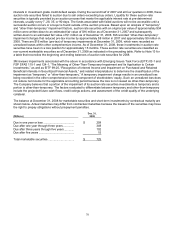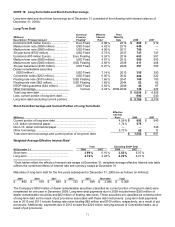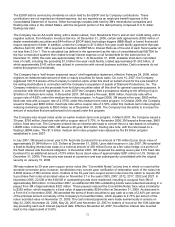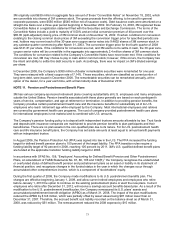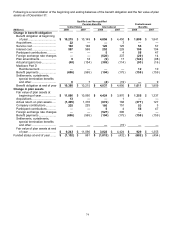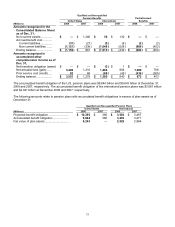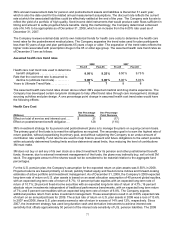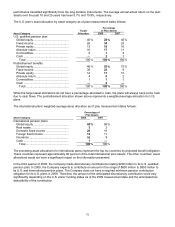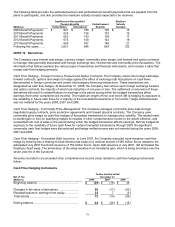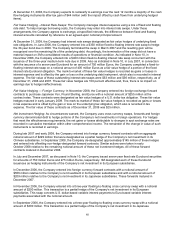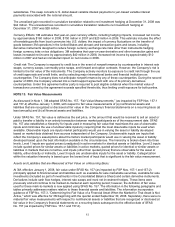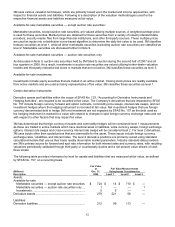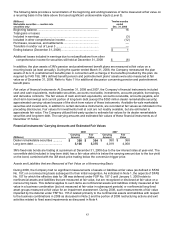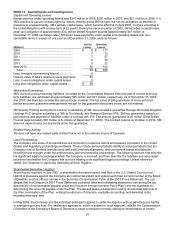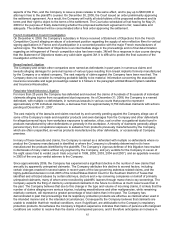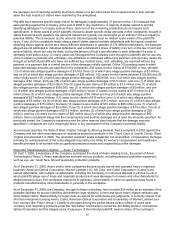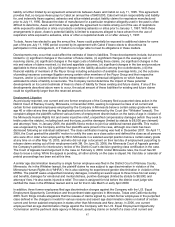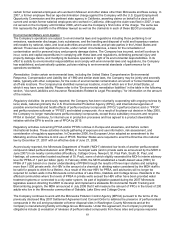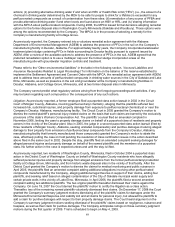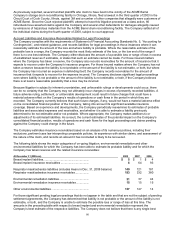3M 2008 Annual Report Download - page 86
Download and view the complete annual report
Please find page 86 of the 2008 3M annual report below. You can navigate through the pages in the report by either clicking on the pages listed below, or by using the keyword search tool below to find specific information within the annual report.80
At December 31, 2008, the Company expects to reclassify to earnings over the next 12 months a majority of the cash
flow hedging instruments after-tax gain of $44 million (with the impact offset by cash flows from underlying hedged
items).
Fair Value Hedging - Interest Rate Swaps: The Company manages interest expense using a mix of fixed and floating
rate debt. To help manage borrowing costs, the Company may enter into interest rate swaps. Under these
arrangements, the Company agrees to exchange, at specified intervals, the difference between fixed and floating
interest amounts calculated by reference to an agreed-upon notional principal amount.
At December 31, 2008, the Company had interest rate swaps designated as fair value hedges of underlying fixed
rate obligations. In June 2006, the Company entered into a $330 million fixed-to-floating interest rate swap to hedge
the 30-year bond due in 2028. The Company terminated the swap in March 2007 and the resulting gain will be
recognized over the remaining life of the underlying debt. Accordingly, the termination of the swap did not have a
material impact on 3M’s consolidated results of operations or financial condition. As indicated in Note 10, in
November 2006, the Company entered into a $400 million fixed-to-floating interest rate swap concurrent with the
issuance of the three-year medium-term note due in 2009. Also as indicated in Note 10, in July 2007, in connection
with the issuance of a seven-year Eurobond for an amount of 750 million Euros, the Company completed a fixed-to-
floating interest rate swap on a notional amount of 400 million Euros as a fair value hedge of a portion of the fixed
interest rate Eurobond obligation. The mark-to-market of these fair value hedges is recorded as gains or losses in
interest expense and is offset by the gain or loss on the underlying debt instrument, which also is recorded in interest
expense. The fair value of these outstanding interest rate swaps were $53 million and $36 million, respectively, as of
December 31, 2008 and 2007. These fair value hedges are 100 percent effective and, thus, there is no impact on
earnings due to hedge ineffectiveness.
Fair Value Hedging — Foreign Currency: In November 2008, the Company entered into foreign exchange forward
contracts to purchase Japanese Yen, Pound Sterling, and Euros with a notional amount of $255 million at the
contract rates. These contracts were designated as fair value hedges of a U.S. dollar tax obligation. These fair value
hedges matured in early January 2009. The mark-to-market of these fair value hedges is recorded as gains or losses
in tax expense and is offset by the gain or loss on the underlying tax obligation, which also is recorded in tax
expense. The fair value of these contracts as of December 31, 2008 was $25 million.
Net Investment Hedging: As circumstances warrant, the Company uses cross currency swaps, forwards and foreign
currency denominated debt to hedge portions of the Company’s net investments in foreign operations. For hedges
that meet the effectiveness requirements, the net gains or losses attributable to changes in spot exchange rates are
recorded in cumulative translation within other comprehensive income. The remainder of the change in value of such
instruments is recorded in earnings.
During late 2007 and early 2008, the Company entered into foreign currency forward contracts with an aggregate
notional amount of $229 million that were designated as a partial hedge of the Company’s net investment in its
Chinese subsidiaries. In September 2008, the Company de-designated approximately $145 million of these hedges
and entered into offsetting non-hedge-designated forward contracts. Similar actions were taken in early
October 2008 relative to the remaining notional amount of these net investment hedges. All of these forward
contracts matured in December 2008.
In July and December 2007, as discussed in Note 10, the Company issued seven-year fixed rate Eurobond securities
for amounts of 750 million Euros and 275 million Euros, respectively. 3M designated each of these Eurobond
issuances as hedging instruments of the Company’s net investment in its European subsidiaries.
In December 2006, the Company entered into foreign currency forward contracts with a notional amount of
$556 million relative to the Company’s net investment in its European subsidiaries and with a notional amount of
$209 million relative to the Company’s net investment in its Japanese subsidiaries. These forwards matured in
December 2007.
In November 2006, the Company entered into a three-year floating-to-floating cross currency swap with a notional
amount of $200 million. This transaction is a partial hedge of the Company’s net investment in its European
subsidiaries. This swap converts U.S. dollar-based variable interest payments to Euro-based variable interest
payments associated with the notional amount.
In September 2006, the Company entered into a three-year floating-to-floating cross currency swap with a notional
amount of $300 million. This transaction is a partial hedge of the Company’s net investment in its Japanese


